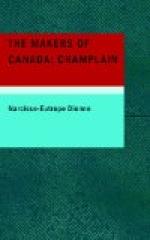On April 25th, 1610, Champlain set out from Tadousac for Quebec, where he found Captain Chauvin and his companions in good health. They had with them a stranger named Captain Batiscan, who was so pleased at Champlain’s return that he and his comrades showed their appreciation by singing and dancing all night. Champlain entertained them at a banquet, with which they were delighted.
Some days after a party of the Montagnais, numbering about sixty men, made their appearance at Quebec, en route for the war. They presented themselves before Champlain, and said: “Here are numerous Basques and Mistigoches (so they named the Normans and Malouins) who say they will go to the war with us. What do you think of it? Do they speak the truth?” Champlain answered: “No, I know very well what they really mean; they say this only to get possession of your commodities.” The Indians replied: “You have spoken the truth. They are women and want to make war only upon our beavers.” Confiding in Champlain’s word, the Montagnais went to Three Rivers under the agreement that a general rendezvous should be held there with the French. The Hurons were to await them at the entrance of the Iroquois River.
Champlain started on his journey on June 14th. When he was eight leagues from Quebec he met a canoe bearing an Algonquin and a Montagnais, who entreated him to hasten towards Three Rivers, as the Algonquins and Hurons would be at the meeting-place within two days. The Algonquins presented Champlain with a piece of copper a foot long and quite pure, and stated that there were large quantities to be found on the bank of a river, near a great lake. The Indians also stated that they collected the copper in lumps, and after they had melted it, spread it in sheets and smoothed it with stones. Champlain was well pleased to receive this present, although it was of small value.
The Montagnais assembled at Three Rivers, and on June 18th they all set out together. On the following day they arrived at an island situated at the mouth of the river Richelieu, which the Montagnais used to frequent when they wished to avoid the Iroquois.
An alarm was soon given that the Algonquins had fallen in with a band of Iroquois, numbering one hundred, who were strongly barricaded. Each man then took his arms and set out in a canoe towards the enemy. The firing immediately began, and Champlain was wounded by an arrow which pierced his ear and entered his neck. He seized the arrow and withdrew it from the wound. The Iroquois were much astonished at the noise caused by the discharge of the French muskets, and some of them, seeing their companions wounded or dead, threw themselves upon the ground whenever they, heard a musket fired. Champlain resolved after a while to force the barricade, sword in hand, which he accomplished without much resistance, and entered the fort. Fifteen prisoners were taken, and the rest were killed either by musket shots, arrows, or the sword. The savages, according to their custom, scalped the dead. The Montagnais and Algonquins had three killed and fifty wounded. On the following day Pont-Grave and Chauvin did some trading in peltry.




